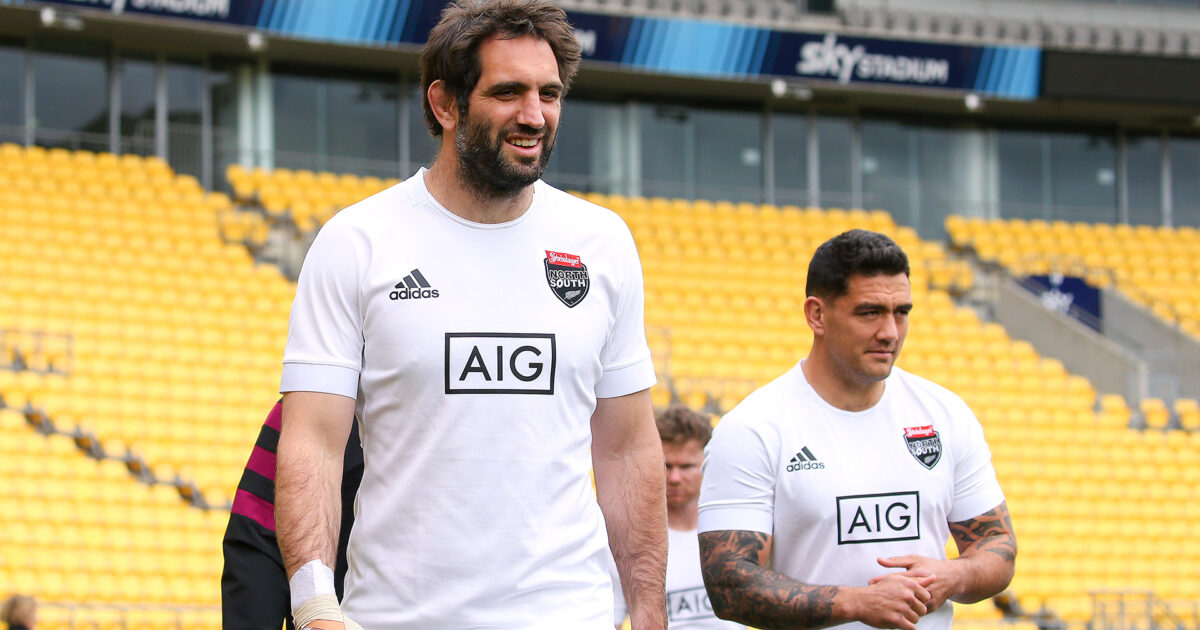Everything you need to know about the 81st North vs South clash

Here’s what you need to know ahead of the North versus South rugby match.
Had it been mooted at the start of the year, a North v South clash could have been missable for New Zealand rugby fans, but now it could turn into the gem of the country’s 2020 sporting calendar.
One of domestic rugby’s oldest rivalries will be renewed on Saturday night with the North versus South derby match. It will be only the third time in 33 years the match has taken place. The match was first played in 1897, and was more or less an annual event from 1902 until 1986.
In 2012 a one-off match was played to help fundraise for the struggling Otago Rugby Football Union.
It is a unique occasion for the players to embrace, playing against teammates they never have before.
“You do get the opportunity to catch up and get to know people pretty well,” South captain Sam Whitelock says. “It’s also really cool to get to know other boys that you don’t play with all the time to work out how they want to do things.”
North skipper Patrick Tuipulotu says the lead-up so far has been “unique”.
“The challenging thing is how we’re going to gel together in the space of a week, but to say that I’m pretty impressed with how we’ve been training,” he adds.
“Having that off-field connection builds trust on field.”
Originally slated for Auckland last weekend, the match had to be postponed due to the second outbreak of Covid-19 in New Zealand. As a result Wellington is the new host which, if location was ever a problem, is a better travel destination sitting as the base of the North Island.
https://www.instagram.com/p/CEuSynqgaY5/?utm_source=ig_web_copy_link
All Blacks assistants John Plumtree and Scott McLeod will coach the North against colleagues Brad Mooar and Greg Feek, who will lead the South. It will be a good chance for their mentor Ian Foster to not only get a look at the talent on offer for potential All Blacks tests this year, but also how his assistants do with the ball in their own courts.
Hope still remains the All Blacks will get on field this year. Talks around a Bledisloe series and Rugby Championship have taken place with both New Zealand and Australia suggested as hosts for up to four countries (including South Africa and Argentina). However the virus’ ongoing influence on global travel, and both Tasman countries grappling with outbreaks paints a sombre picture for international rugby fans.
That could mean the North v South derby might be the biggest match for our All Blacks as well as their coaches. The match succeeds a fruitful Super Rugby Aotearoa campaign that delivered exciting rugby and attracted plenty of fandom. Based on that, fans can expect another enticing on-field product this weekend.
Whitelock notices they are not the betting favourites, but is not worried.
“We’ll take the underdog tag and let Patty [Patrick Tuipulotu] and his team take the favourites tag, and put all the pressure on them,” he says.
Match details:
Saturday, September 5 at 7:10pm, Sky Stadium in Wellington
Squads:
North: 1. Karl Tu’inukuafe 2. Asafo Aumua, 3. Ofa Tuungafasi, 4. Patrick Tuipulotu (captain), 5. Tupou Vaa’i, 6. Akira Ioane, 7. Ardie Savea, 8. Hoskins Sotutu, 9. TJ Perenara, 10. Beauden Barrett, 11. Caleb Clarke, 12. Anton Lienert-Brown, 13. Rieko Ioane, 14. Sevu Reece, 15. Damian McKenzie. Replacements: 16. Ash Dixon, 17. Ayden Johnstone, 18. Angus Ta’avao, 19. Scott Scrafton, 20. Dalton Papalii, 21. Aaron Smith, 22. Peter Umaga-Jensen, 23. Mitchell Hunt.
South: 1. Joe Moody, 2. Codie Taylor, 3. Nepo Laulala, 4. Samuel Whitelock (captain), 5. Mitchell Dunshea, 6. Shannon Frizell, 7. Tom Christie, 8. Tom Sanders, 9. Brad Weber, 10. Richie Mo’unga, 11. George Bridge, 12. Jack Goodhue, 13. Braydon Ennor, 14. Will Jordan, 15. Jordie Barrett. Replacements: 16. Liam Coltman, 17. George Bower, 18. Tyrel Lomax, 19. Manaaki Selby-Rickit, 20. Dillon Hunt, 21. Finlay Christie, 22. Josh Ioane, 23. Leicester Faingaanuku.
Historical record:
Played 80, North have won 50, South have won 27, three draws.
Last five encounters:
2012 – South defeated North 32-24
1995 – North defeated South 63-22
1986 – North defeated South 22-10
1985 – North defeated South 29-12
1984 – North defeated South 39-3










































































